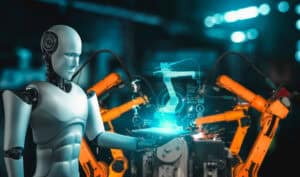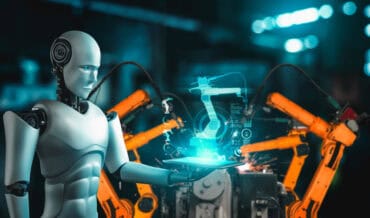
Industrial AI is enhancing automation, predictive maintenance, and quality control, leading to improved efficiency and cost savings.
Industrial AI is a different beast from the friendly chatty gen AI tools that have dominated the headlines. Industrial AI, as its name implies, is dominated by smart-factory initiatives, built on predictive analytics, automation, and efficiency initiatives. And the market for industrial AI tools, such as a constellation of technologies from IoT to robotics, is about to explode like no other technology class ever has.
That’s the word from Market Research Future, which recently put the size of the overall industrial AI market at $6.35 billion at this time, and is estimated to expand 32x to $192 billion by 2034.
This furious growth is driven by “the increasing adoption of artificial intelligence across manufacturing, logistics, and other industrial sectors,” the report’s authors relate. “AI is enhancing automation, predictive maintenance, and quality control, leading to improved efficiency and cost savings.” Add AI-powered robotics and autonomous systems and the possibilities are compelling.
With machine learning and deep learning algorithms inserted into processes, there is potential for reduced downtime and more seamless supply chains. Add to this advancements in data analytics and IoT connectivity that are further fueling the market.
Add to this edge computing and cloud technologies, which is “creating new possibilities for real-time analytics and automation,” the report continues. “The rise of Industry 4.0 and smart factories offers a fertile ground for AI-driven solutions.”
There is an insatiable need for automation and efficiency across industries, the report states. “The growing adoption of IoT and big data analytics enables real-time monitoring, preventive maintenance, and decision-making.
See also: The Economic Impact of AI Agents in Industrial Operations
There are factors that may dampen this growth, however. “High implementation costs and complex integration processes hinder widespread adoption, particularly among small and medium enterprises,” the report’s authors indicate. “Data security and privacy concerns also pose significant challenges, as AI systems rely on vast amounts of industrial data. Additionally, a shortage of skilled professionals proficient in AI and machine learning is limiting market growth. Resistance to change and skepticism about AI’s reliability further slow down adoption rates.”
Addressing these challenges “requires strategic investments in AI education, improved cybersecurity measures, and cost-effective AI deployment solutions,” the report’s authors state.






























